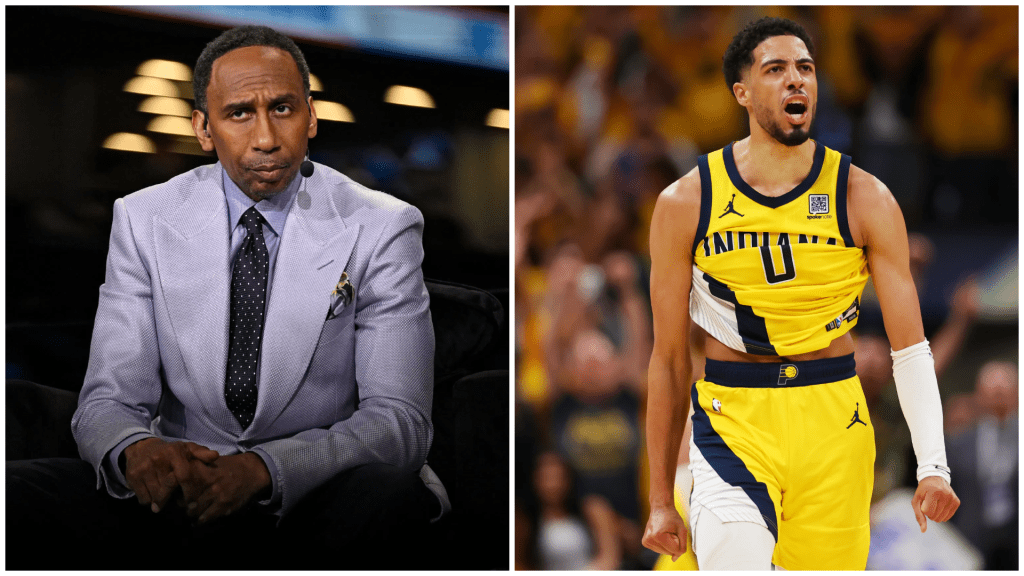
He Called Haliburton ‘Awful’ and Said He’s ‘Glad’ He’s Injured
Okay, so this whole drama started brewing during the NBA Finals, and it’s a roller‑coaster of sports tension, media throwing shade, and fans getting fired up. Here’s the full story—laid out like I’m telling it to you over coffee, with all the texture, emotion, and yes, fan reactions.
When Commentary Crossed the Line
Picture this: The NBA Finals are heating up, Indiana Pacers versus Oklahoma City Thunder. Tyrese Haliburton, the Pacers’ rising star, is playing on a calf that’s been bothering him. He’s locked in, but maybe not at 100%, and Stephen A. Smith—known for never holding back—took to ESPN’s halftime show and completely unloaded.
Stephen A. didn’t hold back. He said Haliburton was playing “awful,” which is already a sharp slam during the biggest stage in basketball. But the kicker that set the internet on fire was:
“Haliburton has looked awful and I’m glad he’s injured.”
That’s right. Smith didn’t just critique his game—he celebrated the injury. And he didn’t whisper it, either. It echoed across sports media panels and broke into discussions everywhere.
When a commentator expresses gladness over a player’s injury, that’s not just tough talk—it’s throwing a punch under the belt.

The Fallout: Fans, Social Media, and Pacers Pride
Almost instantly, fans lost it. Pacers fans didn’t just voice disappointment—they went all in.
At Game 4, two fans in bright orange and blue tuxedos, holding giant face cutouts of Stephen A. and Kendrick Perkins, turned court-side photos into memes. It was part flash mob, part protest, part comedy sketch—but the message was loud: defend Haliburton, call out the commentary.
Over on Reddit, especially threads like r/pacers and r/nba, users were boiling over. One commenter called Stephen A. a “clown” and said, “How can you be this pathetically stupid on live television?” reddit.com. Another noted Stephen A.’s comments sounded personal, kneecapping the professionalism expected in high-stakes broadcast.
Some fans went deeper, saying it wasn’t enough just to mock the comment—it was time to tune out the network. One user said, “Posts get visibility based on engagement…usually drama. Don’t take the bait,” calling out the circus culture in sports punditry.
It wasn’t just fans fueling the fire. Sports media started picking it up, with pieces labeling Stephen A.’s statement “tone deaf” and unloading on how dangerous it is to celebrate injury—even as a hyperbolic hot take.
The Context: Smith vs. Haliburton Tension
This moment didn’t come from nowhere. It’s part of a growing feud.
Earlier in the Finals run, Haliburton said he blocks out the chatter from “talking heads” and doesn’t care about media critics awfulannouncing.com. Stephen A. took this personally—not just responding, but lashing back on First Take: he said Haliburton was “too sensitive,” accused him of playing the victim, and warned him that “players far more accomplished… tried to call me out” and “how has that worked out?”.
This went beyond sports commentary. Now it was a personal clash: the veteran analyst offended by a young star who wasn’t shy about calling out the media.
Then, Haliburton kept shining on the court—clutch shots, big games, even while on that sore calf. Stephen A. couldn’t ignore it; he had to address it again, which he did—this time with that explosively harsh comment about being “glad” for the injury.
Media Ethics: When Hot Takes Cross a Line
Let’s talk about that phrase for a sec. “I’m glad he’s injured.” On a broadcasting network that reaches millions, that’s reckless. It’s not a rhetorical jab—it’s celebrating someone’s suffering. Call it tough talk, but it strikes deep and misses the mark on empathy.
In sports, we expect intensity, for sure. Analysts are paid to be bold. But there’s a difference between blunt and barbaric. That kind of comment puts a spotlight on media responsibility. Every “hot take” gets clicks, sure—but should it?
Fans and critics alike are saying no. It’s a chill reminder that words matter—especially when they involve injuries.
What’s Next?
Will Stephen A. walk it back? Criticism is piling on—from fans, pundits, maybe even ESPN execs. But he’s no stranger to controversy, and he’s got a huge platform and ego to match.
Haliburton? He’s busy preparing for Game 6 with his team. He’s not one for social media rants. If he continues to play at a high level—despite injury, despite the talk—the best answer is letting his performance speak for him.
Pacers fans are geared up. The courtroom-style rebuttal from fans in tuxedos said it all: defend your guy, push back on shade, keep faith on the court. That energy might just fuel a team hungry for a title.
Final Word
So what happened? Stephen A. Smith nailed down one of the most controversial hot takes ever aired during the NBA Finals. He didn’t just criticize Haliburton—he celebrated his injury. And that shift from sharp talk to mean talk is a line that even sports media may regret crossing.
But in the messy mix of big-time Finals coverage, this moment shines as a case study. It’s about power in words, the clash of voices, and why empathy still matters—even—or especially—when stakes are high.
In the end, Haliburton has got the guts and the game. The rest? It’s noise.